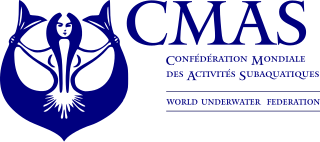A divemaster (DM) is a recreational diving role that includes organising and leading recreational dives, particularly in a professional capacity, and is a qualification used throughout most of the world in recreational scuba diving for a diver who has supervisory responsibility for a group of divers and as a dive guide. As well as being a generic term, Divemaster is the title of the first professional rating of many training agencies, such as PADI, SSI, SDI, NASE, except NAUI, which rates a NAUI Divemaster under a NAUI Instructor but above a NAUI Assistant Instructor. The divemaster certification is generally equivalent to the requirements of ISO 24801-3 Dive Leader.
The National Association of Underwater Instructors is a non-profit 501 (c) (6) association of scuba instructors. It is a recreational dive certification and membership organization established to provide international diver standards and education programs. The agency was founded in 1960 by Albert Tillman and Neal Hess. NAUI is headquartered in Tampa, Florida, US) with dive and member instructors, resorts, stores, service and training centers, located in Japan, South Africa, the Middle East, Europe, Brazil and the Pacific Rim.

A lifeguard is a rescuer who supervises the safety and rescue of swimmers, surfers, and other water sports participants such as in a swimming pool, water park, spa, beach or river. Lifeguards are strong swimmers and trained in CPR/AED first aid, certified in water rescue using a variety of aids and equipment depending on requirements of their particular venue. In some areas, lifeguards are part of the emergency services system to incidents and in some communities,lifeguards may function as the primary EMS provider.

Recreational diving or sport diving is diving for the purpose of leisure and enjoyment, usually when using scuba equipment. The term "recreational diving" may also be used in contradistinction to "technical diving", a more demanding aspect of recreational diving which requires greater levels of training, experience and equipment to compensate for the more hazardous conditions associated with the disciplines. Breath-hold diving for recreation also fits into the broader scope of the term, but this article covers the commonly used meaning of scuba diving for recreational purposes, where the diver is not constrained from making a direct near-vertical ascent to the surface at any point during the dive.

The British Sub-Aqua Club or BSAC has been recognised since 1954 by the Sports Council as the national governing body of recreational diving in the United Kingdom.

Police diving is a branch of professional diving carried out by police services. Police divers are usually sworn police officers, and may either be employed full-time as divers or as general water police officers, or be volunteers who usually serve in other units but are called in if their diving services are required.

Scuba diving is a mode of underwater diving where the diver uses a self-contained underwater breathing apparatus (scuba), which is completely independent of surface supply, to breathe underwater. Scuba divers carry their own source of breathing gas, usually compressed air, allowing them greater independence and freedom of movement than surface-supplied divers, and longer underwater endurance than breath-hold divers. Although the use of compressed air is common, a new mixture called enriched air (Nitrox) has been gaining popularity due to its benefit of reduced nitrogen intake during repetitive dives. Open circuit scuba systems discharge the breathing gas into the environment as it is exhaled, and consist of one or more diving cylinders containing breathing gas at high pressure which is supplied to the diver through a regulator. They may include additional cylinders for range extension, decompression gas or emergency breathing gas. Closed-circuit or semi-closed circuit rebreather scuba systems allow recycling of exhaled gases. The volume of gas used is reduced compared to that of open circuit, so a smaller cylinder or cylinders may be used for an equivalent dive duration. Rebreathers extend the time spent underwater compared to open circuit for the same gas consumption; they produce fewer bubbles and less noise than open circuit scuba which makes them attractive to covert military divers to avoid detection, scientific divers to avoid disturbing marine animals, and media divers to avoid bubble interference.
Scuba Schools International (SSI) is an organization that teaches the skills involved in scuba diving and freediving, and supports dive businesses and resorts. SSI has over 2,500 authorized dealers, 35 regional centers, and offices all over the world.

Scuba Diving International (SDI) is a Scuba training and certification agency. It is the recreational arm of Technical Diving International, a technical diver training organization.

Technical Diving International (TDI) claims to be the largest technical diving certification agency in the world, and one of the first agencies to offer mixed gas and rebreather training. TDI specializes in more advanced Scuba diving techniques, particularly diving with rebreathers and use of breathing gases such as trimix and heliox.
The World Recreational Scuba Training Council (WRSTC) was founded in 1999 and is dedicated to creating minimum recreational diving training standards for the various scuba diving certification agencies across the world. The WRSTC restricts its membership to national or regional councils. These councils consist of individual training organizations who collectively represent at least 50% of the annual diver certifications in the member council's country or region. A national council is referred to as a RSTC.

Confédération Mondiale des Activités Subaquatiques (CMAS) is an international federation that represents underwater activities in underwater sport and underwater sciences, and oversees an international system of recreational snorkel and scuba diver training and recognition. It is also known by its English name, the World Underwater Federation, and its Spanish name, Confederacion Mundial De Actividades Subacuaticas. Its foundation in Monaco during January 1959 makes it one of the world's oldest underwater diving organisations.

A Diving certification or C-card is a document recognizing that an individual or organization authorized to do so, "certifies" that the bearer has completed a course of training as required by the agency issuing the card. This is assumed to represent a defined level of skill and knowledge in underwater diving. Divers carry a qualification record or certification card which may be required to prove their qualifications when booking a dive trip, hiring scuba equipment, filling diving cylinders or in the case of professional divers, seeking employment.

The diving supervisor is the professional diving team member who is directly responsible for the diving operation's safety and the management of any incidents or accidents that may occur during the operation; the supervisor is required to be available at the control point of the diving operation for the diving operation's duration, and to manage the planned dive and any contingencies that may occur. Details of competence, requirements, qualifications, registration and formal appointment differ depending on jurisdiction and relevant codes of practice. Diving supervisors are used in commercial diving, military diving, public safety diving and scientific diving operations.

Diver training is the set of processes through which a person learns the necessary and desirable skills to safely dive underwater within the scope of the diver training standard relevant to the specific training programme. Most diver training follows procedures and schedules laid down in the associated training standard, in a formal training programme, and includes relevant foundational knowledge of the underlying theory, including some basic physics, physiology and environmental information, practical skills training in the selection and safe use of the associated equipment in the specified underwater environment, and assessment of the required skills and knowledge deemed necessary by the certification agency to allow the newly certified diver to dive within the specified range of conditions at an acceptable level of risk. Recognition of prior learning is allowed in some training standards.

A diving instructor is a person who trains underwater divers. This includes free-divers, recreational divers including the subcategory technical divers, and professional divers which includes military, commercial, public safety and scientific divers.

YMCA SCUBA Program was an underwater diving training program operated by the Young Men’s Christian Association (YMCA) of the USA from 1959 to 2008. It was the first nationally organised underwater diving instruction program offered in the United States of America. A program with a similar content is now delivered by Scuba Educators International, an organisation founded by a group of former senior YMCA SCUBA instructors in 2008.

Swedish Armed Forces Diving and Naval Medicine Centre is a centre which is responsible for education and training of divers for the Swedish Armed Forces. The centre is also responsible for research and development and conduct tests for diving medicine, and tests of underwater equipment. The unit is a part of the Swedish Naval Warfare Centre and is based in Karlskrona.













